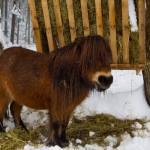Horse Care in Early Spring

As winter months pass and everyone is looking forward to the first hints of spring weather, horses still need regular cold-season care to stay well-fed and healthy. Don’t neglect these areas of horse management:
Blanketing. Blanketed horses should be checked at least once a day and preferably more often to be sure blankets are secure and properly fitted. Many horses lose some weight during a hard winter, and blankets may need to be adjusted for this change. It’s a good idea to have several extra blankets in reserve in case one is torn or gets so wet and muddy that it needs to be taken off the horse for repairs.
Water. Don’t count on horses eating enough snow to stay hydrated. In fact, few horses eat snow. They need constant access to fresh water that is not too cold. Some horses love to play in their water trough, even in really cold weather, and muddy hooves in the tank will mean frequent cleaning and refilling. If the area around the water source gets muddy, frozen, or slick, you may need to spread a thick layer of bedding or fine gravel in this spot to keep horses from slipping or bruising their hooves on frozen ruts.
Hay. Though many people believe horses need extra grain in the winter, a steady supply of forage is actually what keeps horses warm through fermentation in the hindgut. If horses seem cold, increase the supply of moderate-quality hay. Watch to see that timid horses can access hay without being pushed away by more dominant animals.
Turnout. Even on cold, windy days, most horses will benefit from some turnout time, especially if they have the opportunity to find shelter when they need it. Turnout and free exercise will help minimize the respiratory problems, stiffness, and boredom that may plague stalled horses.
Skin. The warm, dark area under horse blankets is a prime spot for the growth of fungal or bacterial skin infections. Unblanketed horses are also at risk for skin infections because of wet, matted coats. Horses should receive at least a light grooming daily, and any skin infections should be treated immediately.
Hooves. Don’t neglect regular trimming and resetting of shoes during the winter, even if horses are not working. Letting hooves get overly long invites chipping, cracking, and a major change in hoof angles with the first spring trim.
Vaccinations. Check with your veterinarian as to the vaccinations your horse will need if he is staying on the farm, heading for spring shows, or getting prepped for a sale. Get these vaccinations on the schedule so immunity will be strong by the time the horse is ready to travel in the spring.








